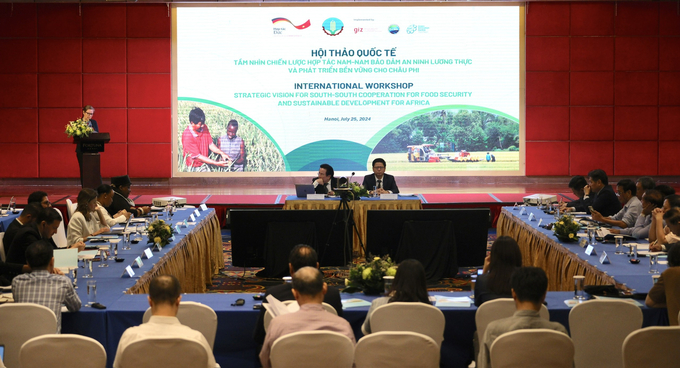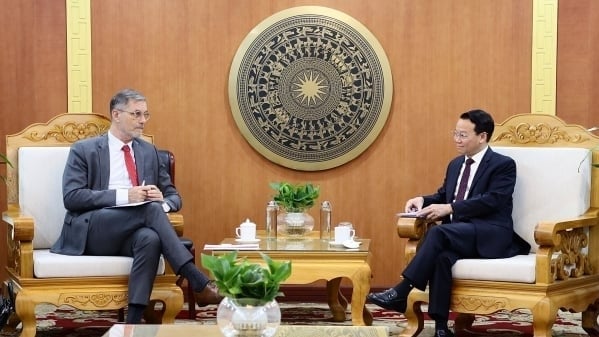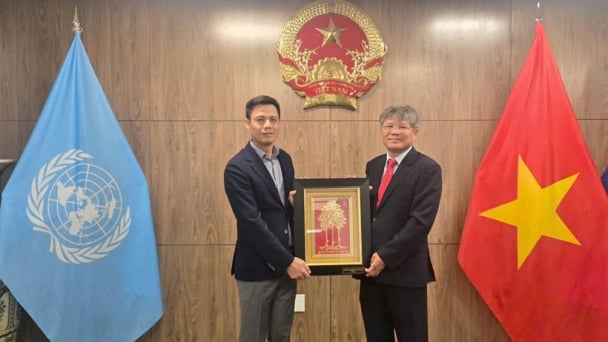May 22, 2025 | 00:37 GMT +7
May 22, 2025 | 00:37 GMT +7
Hotline: 0913.378.918
May 22, 2025 | 00:37 GMT +7
Hotline: 0913.378.918

MARD and GIZ held an International Workshop on “Strategic Vision for South-South Cooperation for Food Security and Sustainable Development for Africa” on July 25 in Hanoi. Photo: Quynh Chi.
This event underscores Vietnam's commitment to leveraging its agricultural expertise to foster South-South cooperation.
The origins of South-South Cooperation (SSC) can be traced back to the Asian-African Conference, also known as the Bandung Conference, held in Bandung, Indonesia, in 1955. This historic conference saw 29 Asian and African countries convene to discuss prospects for cooperation among developing countries. SSC was defined as a mechanism to promote cooperation, share knowledge, experience, skills, and good practices, and to advance science and technology. This includes the exchange of experts in agriculture, healthcare, and climate change.
Dr. Pham Ngoc Mau, Deputy Director of the International Cooperation Department (MARD), highlighted that over the past 60 years, the SSC agenda has provided tailored solutions for global challenges. These include sharing best practices, sponsoring pilot projects, providing capital for successful project expansions, and developing and applying appropriate technologies. SSC remains a significant component of global partnerships for common development. In today’s rapidly changing and unpredictable world, characterized by climate change, epidemics, food crises, poverty, conflict, and the effects of the Fourth Industrial Revolution and digital transformation, South-South cooperation is more crucial than ever to achieve the Sustainable Development Goals (SDGs) by 2030.

Dr. Pham Ngoc Mau, Deputy Director of the International Cooperation Department (MARD) stated that Vietnam is prepared and dedicated to extending South-South cooperation to assist African states in achieving food transformation, providing food security for sustainable and prosperous development. Photo: Quynh Chi.
Vietnam has actively participated and integrated deeply into South-South development cooperation with African countries, building on a foundation of strong traditional relationships. Over the past 60 years, this cooperation has yielded significant achievements, particularly in agriculture, education, and healthcare.
In agriculture, Vietnam has dispatched over 2,000 experts to several African countries, including Sierra Leone, Benin, Madagascar, Guinea, Sudan, Tanzania, Mozambique, and Angola. These experts have assisted in rice cultivation, aquaculture, and sustainable agricultural development. This cooperation has substantially increased rice yields in many African countries, with productivity exceeding 5 tons per hectare, more than three times the previous yield.
Despite these successes, the number of SSC projects in agriculture between Vietnam and Africa remains modest and does not fully reflect the potential and expectations of both governments and their people.
Africa's agricultural potential is immense, with approximately 1 billion hectares of agricultural land, according to FAO statistics. However, the continent faces severe food crises, leading to increased hunger and undernutrition. These challenges are exacerbated by climate change, conflicts, epidemics, and notably the Russia-Ukraine war, which has severely impacted food supplies in some African countries.
With Vietnam's experience and good practices, from a food-scarce country, in the past 30 years, Vietnam has become the 2 largest rice exporter in the world after Thailand. In 2023, Vietnam's rice export turnover will reach 8.13 million tons with a value of 4.67 billion USD, an increase of 4% in volume and 35.3% in value compared to 2022. At the beginning of 2024, Vietnam has implemented a sustainable development project of 1 million hectares of high-quality, low-emission specialized rice associated with green growth in the Mekong Delta by 2030, promising a future of outstanding and sustainable growth for rice production, contributing to ensuring food security for Vietnam and the world.
"Africa should promptly harness its human capital and natural resources to effectively, inclusively, flexibly, and sustainably restructure its food system in order to address various challenges and assure food security. Vietnam is prepared and dedicated to extending South-South cooperation to assist African states in achieving food transformation, providing food security for sustainable and prosperous development. Vietnam's expertise, along with international backing, will contribute to this effort", Mr. Mau stated.
The workshop, exemplifies Vietnam and its international partners' commitment to promoting SSC, supporting development, and ensuring food security for Africa. This workshop aims to open new avenues for close SSC between Vietnam and African countries, as well as trilateral cooperation among Vietnam, Africa, and international partners, fostering prosperity and sustainable development for all parties involved.
Translated by Linh Linh

(VAN) On May 21, Minister of Agriculture and Environment Do Duc Duy worked with Mr. Olivier Brochet, Ambassador Extraordinary and Plenipotentiary of the French Republic to Vietnam.

(VAN) VRG recently conducted a visit and working trip to the United States to demonstrate its efforts in redefining the role of rubber enterprises in the global value chain.

(VAN) In 2024, over 295 million people across 53 countries and territories faced acute hunger—an increase of almost 14 million people compared to 2023, while the number of people facing catastrophic levels of hunger reached a record high.

(VAN) World Environment Day 2025 (June 5) carries the theme 'Beat Plastic Pollution' continuing to emphasize the global urgency of addressing the plastic waste crisis.

(VAN) This was the assessment shared by experts at the workshop titled 'Assessing the Role and Potential of Low-Emission Rice Production Systems in Vietnam,' held on the morning of May 19.

(VAN) Cai Rong Port is the fisheries control center of Quang Ninh, helping to monitor fishing vessels, combat IUU fishing, and remove the EC's 'yellow card'.

(VAN) The German Agricultural Society (DLG) explores the possibility of establishing a mechanization service center in Vietnam’s Mekong Delta to support farmers in accessing and utilizing advanced machinery.